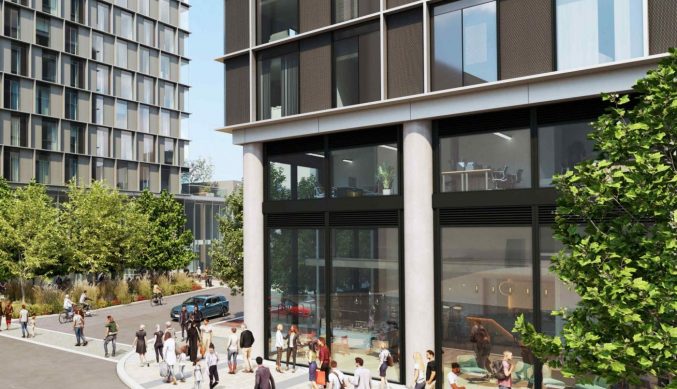The ABC to economic recovery
By David Craik

Alternative Bridging Corporation has vowed to get Britain building again to help the economy and society emerge from the pandemic.
The Hertfordshire based bridging and development finance lender, will unveil a new product called Development 90 later this month which it says will help meet a ‘massive’ pent-up demand for new build property.
“It is a very exciting, market-leading development finance product which will back the UK housebuilding market,” explains ABC director James Bloom. “Through it we will increase loan to value and loan to cost ratios.
We believe it will increase our development finance volumes but also provide a sign that we have confidence in our housebuilders to step up and tackle the undersupply of property. We can help get Britain building again.”
Bloom says the product will be aimed at medium sized, experienced developers who are ‘under-served’ by the finance sector.
“These are developers with a decent track record and a good project but who may not have as quite as much capital as they need to get a standard senior debt product in the market.
They find it hard to get any kind of finance from the high street lenders and we can fill the gap. We are comfortable offering high loan to value loans for the right client with the right product.”
It will be primarily aimed at residential developments, but it will also take in commercial to residential such as repurposing offices or agricultural buildings.
“We are active with new build, conversion and refurbishment and we see continued growth going forward. This is an optimistic time for the business,” he states.
That’s cheering to hear especially considering where ABC, the industry and the country were almost 12 months ago when the first coronavirus lockdown was introduced in mid-March.
Bloom remembers a time of uncertainty and some panic in the market.
“The property market was effectively shut-in terms of surveyors and agents,” he states. “It was very tough to close our transactions as we weren’t able to quickly get surveyors out to carry out valuations and it really put slowed the process. Nonetheless, we battled through and kept to our commitments”
Whilst several lenders reacted by pulling up the drawbridge and suspending lending, ABC stayed steadfast.
“We are a very experienced lender with almost 30 years in the industry. What we didn’t do was panic and hold our hands up in despair,” Bloom explains. “We have carried on lending all the way through from the first lockdown to the second and third.
We were more cautious in March and April because when you are in uncertain times you need an opportunity to reflect and assess the impact on the market.
Nobody knew where we were going. We were particularly cautious around the weird and wonderful stuff but kept our heads down and supported our introducers and their clients.”
ABC also differed from some of the other lenders in that it did not use automatic valuations which, Bloom admits, did mean some clients having longer to wait.
Why didn’t they use automatic valuations?
“It is under review and I wouldn’t say it is something that we will never do!” he says. “But it is not the perfect answer. We’ve never really embraced it because I don’t think there is any substitute for someone physically going out and looking at the condition of a property.
Then we can be flexible because we understand the asset. Automatic does have its place but also limitations.”
Bloom says activity began to recover last summer helped by the ending of lockdown and the introduction of the Government’s stamp duty holiday on property purchases.
“It kept the market buoyant and transaction levels up as people tried to move before the end of March deadline. Although, I’m not sure that the holiday has done what it was supposed to do in terms of stimulating the first-time buyer. It is more the investors or second- and third-time buyers who have benefited the most,” he says.
“In the second lockdown in November and in the current one, the property market has remained open which has made life much easier in terms of getting valuers out, getting viewings on properties and refinancing.
We saw increased demand towards the end of last year and it has continued more strongly into the new year. The activity level is quite surprising.”
ABC has reduced bridging loan rates to 0.65% p/m and increased its LTV on bridging to 70%.
He sees particular demand from property investors, refurbishment loans and regulated development lending.
“People are looking to build their dream property or refurbish because they are improving not moving,” he states. “We are very busy on development financing.
The commercial bridging side is quieter in the retail and hospitality sectors due to the shutdown. But we are still happy to look at shop and uppers, local convenience stores which are still trading fairly well and mixed commercial and residential.
However, the main commercial growth is mainly being seen in sheds, warehousing and distribution centres because of massive online demand. This is an area we are looking at currently.”
Bloom says another challenge is the increasing time taken for bridging loan completions. According to the most recent Bridging Trends report the average completion time averaged 50 days in 2020, up from 47 days in 2019 and 45 days in 2018.
“Speaking to other lenders it is tougher to get completions through at the rate that we would like,” he says. “With everyone working from home things are taking longer. We are beating the industry average of 50 days, but it does rely greatly on proper attention by the borrower’s solicitor.”
Indeed, last November ABC managed to complete a £250,000 refurbishment bridging loan on a North London property within four days of receiving the initial application.
The funds were needed to quickly pay the builders to complete the works and was facilitated by the necessary legal work and valuation being provided upfront.
“We can do these things. We are geared up to completing quickly but no one is getting lots of bridging loans done in a just a week! It is unrealistic.
“We are presently streamlining our underwriting process and cutting out any unnecessary parts.
We are embracing technology where we can such as Nivo to allow for digital identification and clearly as the market evolves you have to add in new questions and requests such as ensuring cladding certifications are in place following Grenfell.
It is always good to review processes and stay on top of your game.”
Adding to client convenience and timings is continued demand for ABC’s ALTERNATIVE Overdraft after it was re-introduced in November following the first lockdown.
It is a flexible loan 2-year non-regulated facility which can be drawn, repaid or reduced when needed. ABC says it avoids delay and expensive setting up charges for clients each time a loan is required.
“It is an innovative and exciting product,” says Bloom. “It really helps property developers and dealers and the business community and in fact any client that needs to move quickly and requires flexibility. We are seeing really good levels of demand for it.”
Bloom says it can introduce new products such as the overdraft and Development 90 because of its close communications and relationships with introducers.
“They are at the coalface. We are in constant contact with them and we listen to what they have got to say,” he explains. “Where is the market under-served and where can we do better than the competition? We have got lots of things in the pipeline such as new refurbishment and term products given the massive demand in those spaces.”
Bloom believes communications have been heightened during the pandemic using Zoom and Microsoft Teams.
“Instead of physically going to see brokers every six months we log on and speak once a month or more often if that is what they want,” he says. “We will see less face-to-face meetings after the pandemic.”
Just to mention an end to the crisis is a positive step for all.
“We don’t know how lockdown will finish and what state the retail and other sectors will be in and we don’t yet know what impact the end of the stamp duty holiday will have.
It remains a challenging time,” Bloom says. “But we are hopeful that this will be the last lockdown and we are bolstered by economic forecasts for next year.
We are taking a cautious but positive note in the running of our business, but we are well capitalised and are well known in the market which counts in our favour.
Things are looking positive. We expect to have a strong year than last year.”
Britain’s builders, developers and homeowners are counting on it.

David Craik is a freelance journalist writing news, feature articles, blogs and guides for national newspapers and magazines. His main areas of interest include finance, property and investments.










You must be logged in to post a comment.